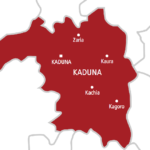by way of written address to a suit instituted by the Society For Advancement & Protection of Public Rights, appear to confirm suspicions the Goodluck Jonathan administration is averse to the use of Permanent Voter Cards (PVCs) in the forthcoming elections. The PVCs, along with card readers, are meant to provide assurance of transparency in the conduct of the elections, thereby enhancing the acceptability of the outcomes.
Adoke’s office and the Independent National Electoral Commission (INEC) are co-defendants in the suit seeking the interpretation of sections 77 (2) and 112 of the Constitution and Section 9(5) of the Electoral Act.
In response to the originating summons, Adoke’s office filed two affidavits arguing against the use of PVCs, arguing that if the elections were conducted mainly with their deployment, the constitutional right of the many eligible voters would be breached.
But when the document became public, causing outrage of possible subterranean moves to scuttle the polls, Mr Adoke wasted no time to disown the court filings, saying they were done without his say-so.
“I wish to categorically state that I was not aware of the contents of the counter affidavit deposed to by Lawrence Illop, and did not authorize it,” Adoke said after the content of the documents had gone viral on social media. He said that though Messrs Taiwo Abidogun and N.S. Odusola, who signed the written address in support of the counter affidavit, were members of his staff, they did not clear from him before filing the documents.
“The officers did not avail me the opportunity of perusing or vetting the affidavit and written address before they were filed,” he said, explaining that the Attorney General was normally given copies of all court processes prepared in reply to suits against his office and his opinion obtained, but that due process was not followed in this instance. Adoke said he had directed the processes be withdrawn to enable an appropriate response to be filed to the originating summons.
INEC chairman, Professor Attahiru Jega, had made it clear from the beginning that the commission would use of PVCs for elections and that anyone without the PVC would not be allowed to vote. Merits of using the PVCs, each of which has an inbuilt microchip that makes it easy to identify the voter he said, include the expectation that it would go a long way in preventing various forms of electoral malpractices. This is a goal that every democracy should aim for. Paradoxically however, that Adoke, who should be aware of the reasons for the introduction of the PVCs, and who has been part of decisions for the government to release various sums for the purpose of producing and distributing the cards, would be moving against their use at this 11th hour is deeply troubling.
The intervention of his ministry at this stage is at variance with avowed commitment of the government, of which he a key part, towards credible elections; but such subterfuges create the impression that the government has all along not been sincere about the use of the PVCs. Government officials need to tread carefully in a matter as sensitive as this in which it has no other option but to stand on the side of credibility and fairness of the polls in order not to be seen as the very institution working against its agency.
It is clear that with the much that has put in place by INEC and the awareness of the public on the use of PVCs that it would be whipping a dead horse for anybody not least of all the Attorney General and Minister of Justice to be clamouring for a return to the use of temporary cards that are prone to abuses.
Adoke’s explanation on the affidavits falls short of a standard that should convince anyone, because it would be stretching credulity that such sensitive documents, which take time and scrutiny to prepare, would go out of his ministry and find its way to the courts without his knowledge. In any case, no one has been reprimanded for that serious slip.
The least Mr Adoke should do is to reaffirm the commitment of the government towards having credible elections.
Campaigns against electoral integrity
by way of written address to a suit instituted by the Society For Advancement & Protection of Public Rights, appear to confirm suspicions the Goodluck…



